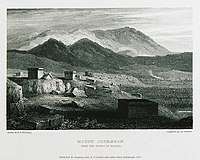Contest of Cithaeron and Helicon
The Contest of Cithaeron and Helicon (PMG 654) is a fragment of a poem by Corinna. It tells the story of a singing competition between two mountains, Cithaeron and Helicon, which was apparently won by Mount Cithaeron.

Preservation
The poem is preserved on a second-century BC piece of papyrus, P.Berol. 13284.[1] The papyrus was discovered by Otto Rubensohn at Hermopolis in 1906.[2]
Poem

The contest poem is about a singing contest between Cithaeron and Helicon; conflict between these two mountains is known from other sources, but Corinna's poem is the only known mention of a singing contest between the two.[3] In Corinna's poem, Cithaeron apparently wins the contest; in other versions of the story, Helicon is the victor.[4]
The surviving part of the poem begins with one of the singers concluding his song, which tells the myth of how the titan Rhea hid her youngest child, Zeus, from Cronus.[5] The poem continues with the gods voting on the winner of the contest, and awarding the victory to Cithaeron.[6] Next, Helicon throws a down boulder in his anger, which breaks into ten thousand pieces.[5]
Corinna's use of the story of Rhea and the birth of Zeus in the poem is apparently influenced by Hesiod's account of the same myth in Theogony.[7] There are several verbal echoes of Hesiod in Corinna's version of the story, though she also adds her own innovations – such as the inclusion of the Curetes, which are not mentioned in the Theogony.[8]
Performance
Corinna's poems were probably mostly written for choral performance in connection with local festivals.[9] The contest poem may have been written for performance at the Daedala, a festival in honour of Hera at Plataea, which was held in part at the summit of Mount Cithaeron.[10]
References
- Page 1962, pp. 326–327.
- Berliner Papyrusdatenbank.
- Campbell 1967, p. 411.
- Henderson 1995, p. 35.
- Henderson 1995, p. 33.
- Corinna, 654 PMG ll.18–27
- Collins 2006, pp. 26–28.
- Vergados 2012, p. 102.
- Larmour 2005, p. 41.
- Larmour 2005, p. 37.
Works cited
- "P. Berol 13284".
- Campbell, David A. (1967). Greek Lyric Poetry: A Selection of Early Greek Lyric, Elegiac and Iambic Poetry. Macmillan.CS1 maint: ref=harv (link)
- Henderson, W. J. (1995). "Corinna of Tanagra on Poetry". Acta Classica. 38.CS1 maint: ref=harv (link)
- Larmour, David H. J. (2005). "Corinna's Metis and the Epinikian Tradition". In Greene, Ellen (ed.). Women Poets in Ancient Greece and Rome. University of Oklahoma Press.CS1 maint: ref=harv (link)
- Page, Denys (1962). Poetae Melici Graeci. Oxford University Press.CS1 maint: ref=harv (link)
- Vergados, Athanassios (2012). "Corinna's Poetic Mountains: PMG 654 col. i 1–34 and Hesiodic Reception". Classical Philology. 107 (2).CS1 maint: ref=harv (link)